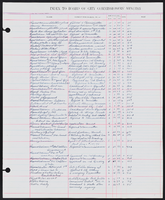Search the Special Collections and Archives Portal
Search Results
Reflections: The Las Vegas Asian American & Pacific Islander Web Archive
Identifier
Abstract
Reflections: The Las Vegas Asian American & Pacific Islander Web Archive is comprised of archived websites captured from 2022 to 2024 that are related to UNLV University Libraries community documentation project, "Reflections: The Las Vegas Asian American & Pacific Islander Oral History Project." Archived websites represent local Asian American and Pacific Islander (AAPI) civic and service organizations and individuals that have been interviewed as part of the oral history project. The collection includes archived websites of organizations such as the Las Vegas Asian Chamber of Commerce, the Asian-American Advocacy Clinic, Asian Community Development Council, and Thai Culture Foundation. Archived websites of individuals represented in this collection includes entrepreneur, real estate investor, and motivational speaker Lisa Song Sutton and magician Juliana Chen.
Archival Collection

Transcript of interview with Norman Christiansen by James Courtney, November 28, 1986
Date
Archival Collection
Description
Text

Carmon Meswarb interview, April 15, 1976: transcript
Date
Archival Collection
Description
On April 15, 1976, Judy Hammer interviewed Carmon Meswarb (b. February 9, 1932 in Cedar Falls, Iowa) about his life as a musician in Las Vegas, Nevada. Meswarb discusses how he ended up in Las Vegas, the musicians union and his time playing in a relief band. Meswarb also delves into the different entertainment acts of the 1950s and 1960s, the big-name performers, the city’s showgirls and racial segregation in entertainment. Moreover, Matson talks about the changing landscape of the city, residential areas and the changed attitude of the Strip. The interview ends with Meswarb discussing the short stint of Broadway shows on the Las Vegas Strip.
Text

Mike Meade interview, February 28, 1977: transcript
Date
Archival Collection
Description
On February 28, 1977, collector Steve Gortz interviewed Mike Meade (b. September 16, 1950 in San Francisco, California) about his life in Nevada. Meade speaks about growing up in Tonopah, Nevada before its decline in population, his move to Elko, Nevada and eventually to the city of Las Vegas. Moreover, he talks about the development of the Strip, the differences between Las Vegas and rural Nevada, as well as the changing environmental landscape. Meade also spends time discussing the controversy surrounding the University of Nevada, Las Vegas (UNLV) dormitory at the time of this interview, the attitude of locals, and his opinion on brothels and prostitution. Lastly, Meade talks about the city’s pollution, the sports and recreation throughout the whole of the state and ends by reading a poem about Nevada from a Bicentennial book.
Text

Transcript of Interview with Julia A. Payne, 2004
Date
Archival Collection
Description
Julia Payne, the Executive Director of the Nevada Treatment Center, talks about Las Vegas from the 1960s to the time of the interview.
Text

Transcript of Interview with Estralita Williams
Date
Archival Collection
Description
Estralita Williams is a native of Las Vegas. Her father was a pastor; she and her sisters sang with choir that backed up celebrity musicians such as Paul Anka. Estralita worked for the EOB.
Text

Transcript of interview with Henry L. Regan Jr., October 12, 2012
Date
Archival Collection
Description
Henry grew up on Westside as a self-described "wild" boy. He was employed as skycap for 32 years at McCarran International Airport.
Text


